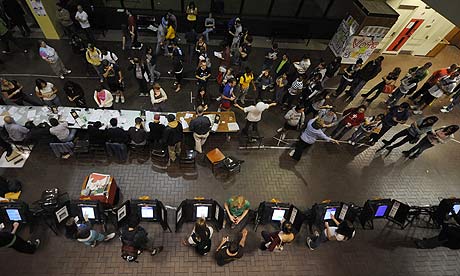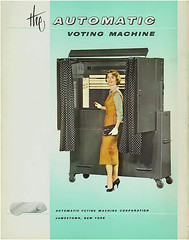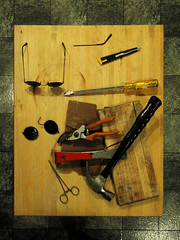Citizens' Election Modernization Advisory
Committee Meeting
Thursday, December 10, noon
NYS Board of Elections
40 Steuben Street
Albany

Why? Lever machines work. Electronic voting doesn't. Lever machines are tamper-proof. Electronic voting isn't. There's no budget impact to keeping our lever machines. It will cost our towns -- that means us -- millions to change.


The Mayor of Woodstock: Elections and Decent People: "Perhaps you've heard the uproar over the quadrupled costs of maintaining the Ulster County Board of Elections ($442,000 in 2005, proposed $1,677.000 for 2009). You will if you haven't; every town supervisor and mayor in the county is outraged since he or she is expected to add an incredibly spiked figure to his or her respective municipal budget."
If you liked this post you may want to sign up for automatic updates. You can choose the RSS feed or an email subscription at the bottom of the sidebar.

Blog � Resolved: NY Communities Want Levers: "The InterCounty Legislative Committee of the Adirondacks, representing ten NY Counties, yesterday passed a resolution urging the State to allow counties to keep using lever voting systems. Delaware County passed a resolution the same day, bringing the quickly growing total of individual county resolutions to 11. More counties are expected to follow suit."The puzzling thing is that several of the counties that have passed resolutions unanimously are listed as participants in the "pilot." Rumor has it that some have tried to drop out of the pilot without success. Others are planning a 100% count of the paper ballots and working hard to ensure that chain of custody procedures for the paper are in place.
 Image via Wikipedia
Image via Wikipedia
Disappeared News: Hawaii’s 2010 elections enjoined by Maui judge: "Judge Joseph E. Cardoza granted an injunction today against Hawaii’s illegal use of electronic voting machines and the illegal transmission of vote results over the Internet. A written decision will be issued in the coming weeks, he said.The suit was brought by residents of Maui who were concerned that the transmission of votes via telephone and internet could be hacked and votes flipped without the public knowing.
The suit (Babson v. Cronin, Civ No. 08-1-0115(3) ) was brought by attorney Lance Collins on behalf of five citizens of Maui against Hawaii’s Chief Elections Officer (see background on Disappeared News in these articles). The suit challenged three aspects of the voting process, according to attorney Collins:
1. The use of electronic voting machines was not adopted
through lawful rulemaking n accordance with the Hawai'i Administrative Procedure Act (HAPA).
2. The use of the Internet and/or telephone lines to transmit
vote counts was not adopted through lawful rulemaking (HAPA).
3. The use of the Internet and/or telephone lines to transmit
vote counts is not allowed under current state law."
 Image by stevegarfield via Flickr
Image by stevegarfield via Flickr
JAMES P. PINKERTON: Will Democrats Become a Permanent Majority Thanks to Internet Voting? � FOX Forum � FOXNews.com: "So if vote fraud is already a problem, what will happen when the “vote” is simply an electronic pulse, that could have come, potentially, from anywhere in the US–or around the world? Who will oversee the e-voting process? And who will oversee the overseers?"
...But of course, the high-tech nature of digital democracy adds a new layer of complexity, as well as mystery, to the voting process. In theory, the technology is completely neutral. But theoretical technology and practical politics are two different things. Diebold, a leading manufacturer of traditional voting machines, has come under repeated fire for alleged pro-Republican bias. But the complexity of a voting machine is nothing compared to the complexity of computers and the Internet.
...So what’s needed immediately is a completely fair and transparent process to examine all facets of the transition to Internet voting. And the only way to achieve that fairness and transparency is to create a rigorously bipartisan outfit to oversee the implementation of such technology, modeled after either the Federal Election Commission, or the private Commission on Presidential Debates.
 Image by winkydo via Flickr
Image by winkydo via Flickr
Election Integrity: Fact & Friction: New York Rolls Out Uncertified Voting Systems for 2009 Elections: "ALBANY -- At a May 12th Commissioners' meeting, after collaborating with the US Dept. of Justice, the New York State Board of Elections cavalierly decided to risk the disenfranchisement of nearly a million of the state's voters, by allowing what one commissioner called a 'huge pilot' of uncertified software-driven electronic vote-counting systems around the state in 45 of its 62 counties."As we've discussed here in the past, certification doesn't mean secure. It means that an independent testing lab has put a machine through its paces to determine whether that model, at that point in time, meets the criteria that the Federal Election Commission has laid out. The current criteria was published a couple of years ago; new, more stringent criteria is currently in the public comment phase. Neither set of criteria addresses security because software-based systems, by their nature, can't be secured.,

Franklin County to ditch lever voting machines - Adirondack Daily Enterprise: "TUPPER LAKE - Franklin County, along with four other counties, will switch to using electronic voting machines exclusively by this year's elections.
'We believe it is time to go ahead and go forward with one voting machine instead of three different ones,' said county Board of Elections Republican Commissioner Veronica King.
The announcement from Franklin, Jefferson, Lewis, Oswego and St. Lawrence counties followed on the heels of Essex County's passage last week of a resolution requesting the state make it legal for counties to keep lever voting machines in addition to the one electronic voting machine that is already available at each polling place in the state."
"I oppose the experimental use of uncertified scanners in real elections without a 100% hand-count on election night of all votes processed by those scanners. The hand-count must be the official tally of those votes for all purposes. Any "pilot program" to introduce uncertified scanners to staff and voters must not be the basis for counting or reporting election results.
In addition, I urge you to use this pilot experiment to implement the recommendation of the New York City Council as expressed in Resolution 228A of 2006 passed unanimously in August, 2006, and quoted below. Otherwise the pilot will be little more than a test of whether voters can insert a piece of paper into a slot on an optical scanner, and the scanner can print a reasonable-looking tally report at the end of the day. "
Conduct a Mock Election Public Test with the objective that such
Mock Election Public Test would demonstrate that:a. Vendor documentation, training materials, and the ability to train election staff are effective, such that the vendor can train Board staff so that Board staff can: (i) independently perform all tasks to prepare the test machines for the test, including ballot programming, (ii) train election inspectors for the test, and (iii) perform all
post-election tasks to canvass the votes;b. Votes displayed on screens and voter verified printouts, tallies, and activity and event logs for all systems under consideration are accurate;
c. Tabulating equipment associated with each system under consideration is accurate;
Send your letters to New York State Board of Elections: James A. Walsh, Co-Chair; Douglas A. Kellner, Co-Chair; Evelyn J. Aquila, Commissioner; Gregory P. Peterson, Commissioner; Todd D. Valentine, Co-Executive Director; Stanley L. Zalen, Co-Executive Director
 Image via Wikipedia
Image via Wikipedia
Philippine News -- Manila Standard Today -- Fears over poll automation -- may4_2009: "The automation law, according to its principal author, Senator Richard Gordon, requires the contractor of the automation project to comply with at least 18 specifications to ensure the 100-percent accuracy and efficiency and to ensure that the process is free from hacking and manipulation. But so extreme is the apprehension of the doubting Thomases over the threat of hacking that it has reached paranoiac proportion. This prompted Senator Alan Peter Cayetano to come out with an outlandish proposal to allocate P100 million out of the automation budget as a reward to anyone who can successfully hack the voting machines, supposedly to put in place the necessary counter-measures."
Re-Media Election Transparency Coalition: "Essex County wants to keep using its dependable lever voting machines, according to today's vote by the Board of Supervisors. Citing the 'insurmountable' costs of the optical-scan systems mandated by the Election Reform and Modernization Act (ERMA), the Board passed a resolution 'supporting the continuation of our lever voting machines together with Ballot Marking Devices (BMD) and rejecting the use of a computerized voting system[.]' The resolution requests that the State Legislature and Board of Elections enact the necessary laws to allow counties to keep their current election systems."Read more at the Election Transparency Coalition's site.
 Image via Wikipedia
Image via Wikipedia
Essex to join counties demanding to keep lever voting booths - Fox 44 - Burlington and Plattsburgh News, Weather and Sports - Fox44.net |: "ELIZABETHTOWN, N.Y. (AP) - Essex County in the Adirondacks is joining a growing number of counties trying to save old-fashioned lever voting booths.
The county Board of Supervisors is expected to pass a resolution Monday morning supporting retention of the mechanical booths. The New York State Association of Towns is also calling on state lawmakers to keep the lever machines."
 Click the box … voters from Pittsburgh, Pennsylvania, during last
Click the box … voters from Pittsburgh, Pennsylvania, during lastGuardian "It’s commonly said that insanity is doing the same thing over and over again while expecting different results. Yet this is what we keep doing with electronic voting machines — find flaws and try again. It should therefore have been no surprise when, at the end of March, California’s secretary of state’s office of voting system technology assessment decertified older voting systems from Diebold’s Premier Election Solutions division. The reason: a security flaw that erased 197 votes in the Humboldt county precinct in last November’s presidential election.
Clearly, 197 votes would not have changed the national result. But the loss, which exceeds the error rate allowed under the Help America Vote Act of 2002, was only spotted because a local citizen group, the Humboldt County Election Transparency Project (humtp.com) monitored the vote using a ballot-imaging scanner to create an independent record. How many votes were lost elsewhere?"
“It’s nothing new. These are all security flaws that are well known in the industry. Why are they acting as if this is the first time they’ve heard this?” The audit log problems were documented in Bev Harris’s 2004 book, Black Box Voting (blackboxvoting.org).
Mercuri explains that election software belongs to the class of problems known as “NP-complete,” that is, problems computers cannot solve in a known amount of time. How much time have you got to test that a given voting system will function perfectly under all possible circumstances?
“What are people going to do about it?” she asks. “Say we fixed it when it’s theoretically not possible to fix these things at any real level?”
At least with voting, citizen groups are motivated to push for greater transparency. In the UK, Jason Kitcat, Green councilor for Brighton and Hove, on the south coast of England, organized volunteers to observe e-voting trials in the 2007 local government elections in England and Scotland on behalf of the Open Rights Group.This is a good overview of the issues today. NY has been the last holdout. Let's not let it happen here.
“We saw the same audit log issues,” he says. “We know from a computer science point of view that making an audit log that can’t be changed is impossible. But it seems as if there’s a huge disconnect between people who are computer-science literate, and the people delivering the policy.” [my emphasis]
Besides, politicians like making uncontroversial decisions. Who could fault them for trusting a company that makes ATMs worldwide? Again, it comes back to humans.
“The folks who buy ATMs [bank managers] and voting machines [election officials] don’t really want to pay for a facility that will make it easier for people to challenge them,” says Ross Anderson, a professor of security engineering at Cambridge University, England.
“In the long run, of course, this ends up costing them more: fraud can lead to challenges that are systemic rather than local. Nevertheless, the purchasers may be rational. Most of the bank managers who bought crap ATM systems in the ’80s are retired now — they got away with it. With voting machines, some vendors have been discredited in some countries, but lots of money has still been made.”
That is, from us — the taxpayer and the bank customer. Kitcat says: “It is shocking that in this day and age this has been allowed to continue.”
 Image by R. Wahtera via Flickr
Image by R. Wahtera via Flickr
Challenges to second-home voters prolong House race count:
One factor that has not hindered the vote count is voting machine technology. The two commissioners agreed that the familiar, mechanical lever machines worked well during the March 31 election. Mr. Kline called them foolproof. Ms. Martin said they were completely reliable and functioned beautifully.
Asked whether the board had considered using the new electronic ballot marking voting machines for the special election, Mr. Kline said, “It would have been a nightmare. Every paper ballot might have been contested.”
Ms. Martin said that time did not permit using the new machines, and she said the cost to taxpayers of using them would have been considerable. Just licensing software for a one-candidate election would have cost up to $80,000, with ballots costing an additional $20,000, and that’s just the beginning. Prices for ongoing services from voting machine vendors will be going up soon, she said.
Both commissioners support a resolution adopted in January by the county Board of Supervisors asking the state for permission to retain the lever voting machines while augmenting them with the new, handicapped-accessible ballot marking devices that counties all over state were required to purchase last fall."

Clear evidence: Lever voting works -- Page 1 -- Times Union - Albany NY: "In a democracy, it is the Legislature's responsibility to create a structure in which voting can occur in the most secure manner, one that produces demonstrably certain election results. Just as in a criminal trial, where the state must prove the defendant's guilt to the satisfaction of a jury, in an election the state must establish its innocence to the satisfaction of the public. In both cases, the state must sustain its burden with unimpeachable evidence."


Voting in cyberspace -- Page 1 -- Times Union - Albany NY: "Studies in recent years have raised plenty of red flags. A 2004 review of the $22 million Secure Electronic Registration and Voting Experiment, conceived by the Department of Defense for military and other overseas voters, raised such major security concerns that it urged the program be scrapped. It warned that using the Internet opened the door to election tampering, vote-buying, viral attacks and privacy violations. Attacks from a lone hacker or an enemy state could result in large-scale voter disenfranchisement, the study warned, and might not even be detected.
Not only is such mischief easy, the study said, but unavoidable under the present structure of the Internet. And, it noted, the temptation to hack into something as sacrosanct as an America election would be huge:
'A U.S. general election offers one of the most tempting targets for cyber-attack in the history of the Internet, whether the attacker's motive is overtly political or simply self-aggrandizement.'"
I agree.So experiments like New York City's are worth close scrutiny. They may point the way to a new frontier. They may reveal the flaws that need to be fixed. Or they may show us that for now, a good old fashioned trip to the polls, or a mailed-in paper ballot, is as high-tech as we want democracy to be.
The issue:
The first all-Internet election, of sorts, is under way.
The Stakes:
We're not ready to toss the voting booths just yet.
The Raw Story | Most electronic voting systems can be hacked, CIA expert says: "'Computerized electoral systems can be manipulated at five stages, from altering voter registration lists to posting results,' a summary of his remarks said.I hope you'll click the link and read the whole story. It makes the notion of op-scanners and paper ballots seem pretty silly.Moreover, Stigall said that the CIA believes Venezuelan President Hugo Chavez may have fixed a recent recount in his favor using such tactics. Chavez, he said, controlled most of the voting machines used and may have provided the program that was used to 'randomly' select machines for audit during a recount.
The voting machines Venezuela used were made by Smartmatic, a company that partnered with Chavez's government which was owned by US-based Sequoia systems until 2007. Sequoia also provides voting machines for the District of Columbia and 16 US states."
 Counting the paper ballots in the NY District 20 Congressional race is underway. I've been thinking about how lever machines make the counting different from Minnesota, or from NY if an op-scanner system is implemented.
Counting the paper ballots in the NY District 20 Congressional race is underway. I've been thinking about how lever machines make the counting different from Minnesota, or from NY if an op-scanner system is implemented.Re-Media Election Transparency Coalition: "Unlike the recent close race in Minnesota that was decided by a manual recount of post-election night paper ballots, not shown to have been the same ballots cast at the election, today’s commencement of New York’s absentee paper ballots will be publicly observed from the moment they are cast, through the counting. Novick says, “New York’s Constitution has always required an observable, open electoral process that produces evidence of the count at the time the votes are cast, ensuring maximum protection against fraud.”
“The Republican Party will have the proof it seeks, at least this year.” “But,” she warns, “If we permit the State to abandon our lever voting system for software-based scanners, it will be the last time any one will have evidence of who won the election.”"
New Democracy Blog | by Warren Slocum: They'll Be Voting From Starbucks In New York City: "Starting April 6th and running through April 12th, NYC's, public school parents will be eligible to cast advisory votes for members of their community education councils. The unpaid council members play a role in various operational issues and help schools develop their budgets."

The Daily Mail Online: "According to Democratic Elections Commissioner Thomas Burke, the decision is out of the county’s hands. While he agreed that the lever machines could conceivably work better than the newer optical scan voting machines, the state leaves them with no choice — everyone will soon make the switch.
“Are the new machines as good as the old ones? I don’t think so, but everyone in the State of New York will have to switch to the optical scan machine,” Burke said. “We don’t know when the change will happen, but it will happen.”
Nothing short of litigation will stop the switch, Burke added, and in other counties where that has been tried, it has failed."

Five Clay County officials, including the circuit court judge, the county clerk, and election officers were arrested Thursday after they were indicted on federal charges accusing them of using corrupt tactics to obtain political power and personal gain.
The 10-count indictment, unsealed Thursday, accused the defendants of a conspiracy from March 2002 until November 2006 that violated the Racketeering Influenced and Corrupt Organizations Act (RICO). RICO is a federal statute that prosecutors use to combat organized crime. The defendants were also indicted for extortion, mail fraud, obstruction of justice, conspiracy to injure voters' rights and conspiracy to commit voter fraud.
LEX18 - Lexington, KY - News, Weather, Sports - Several Clay County Officials Arrested On Federal Charges: "# Clay County Clerk, Freddy Thompson, 45, allegedly provided money to election officers to be distributed by the officers to buy votes and he also instructed officers how to change votes at the voting machine. The indictment also accused Thompson of a false testimony before a grand jury in Lexington."

No Decision Soon in Upstate House Race - City Room Blog - NYTimes.com: "Mr. Conklin hesitated to guess when a winner could be named, noting instead that in November’s State Senate race in Queens between the incumbent Republican, Frank Padavan, and City Councilman James F. Gennaro, a winner was not determined until February, and that the results were not certified by the state board until March 10.
“That’s one of the perils of the whole paper ballot system,” Mr. Conklin said. “This will be a massive undertaking, and this is only dealing with the absentees. Out of 155,000 votes cast, we’ll be arguing over the 6,000-plus that come back.”"

NIST Tech Beat - Apri1 1, 2009: "NIST Issues Open and Transparent Methods for Testing Electronic Voting SystemsI haven't looked at the draft yet, and I'm not a geek, so I may not be able to understand them when I do look, but here are the questions that immediately occur to me:
GAITHERSBURG, MD – The U.S. Department of Commerce’s National Institute of Standards and Technology (NIST) today opened for public comment detailed new methods for testing future electronic voting systems' compliance with voluntary federal standards. Touch screens, optical scanners and other kinds of electronic voting systems now appear at polls across the nation.
The new draft tests can be viewed at http://vote.nist.gov/voting-system-test-suites.htm."
 Image by striatic via Flickr
Image by striatic via Flickr

Budget cuts endangering city elections, Board of Elections says: "The cuts come during the two most demanding election periods - last year's presidential elections and this year's municipal elections - when all city offices will be on the ballot.All this when, according to Andi Novick at the Election Transparency Coalition, this same body, the NYC Board of Elections, ran an illegal paper ballot recount on Staten Island recently. You can read their blog post here.
The budget cuts also come as the board is preparing to switch to new electronic voting machines for this year's elections - although Cederqvist acknowledged that developments on the state and federal court levels could postpone that switch for another year.
The mayor's proposed cuts for the new budget would not leave enough money to run all the elections expected this year, including possible runoff elections, Cederqvist said."

Voting advocate pushes for new system in Madison County - syracuse.com: "'I know how fond many of you were of the lever machines - and how frustrating the long process of getting scanners certified has been,' Berry said Tuesday to legislators in Wampsville. 'But the lever machines do not measure up to the standards for election integrity that most people now hold and that New York's Election Reform and Modernization Act requires.'This doesn't make sense when you consider that:

Schuyler seeks state OK to keep lever voting | stargazette.com | Star-Gazette: "MONTOUR FALLS - Schuyler County legislators on Monday night asked the state to allow New York's counties to continue to use lever-style voting machines.
Advertisement
The request was added to a resolution originally focused on asking for more funding for local governments to replace existing machines. The replacement was ordered by the state's Election Reform and Modernization Act of 2005, a response to the federal government's Help America Vote Act, known as HAVA, approved by Congress in 2002.
The new language was based on a resolution approved last month by the Ulster County Legislature.
'The state's statutorily required elimination of lever-style voting machines is unnecessary, inappropriate and costly,' the unanimously approved resolution states.
'To throw out lever machines that haven't needed repairs in years is senseless,' Legislator Glenn Larison, R-Odessa, said."
 Image by Getty Images via Daylife
Image by Getty Images via Daylife
Schuyler vote machine conversion costs more | stargazette.com | Star-Gazette: "Fagan and O'Hearn said counties initially were led to believe that federal funds would cover all costs. Now, counties are finding out local taxpayers may have to pay for the software necessary to program the ballots. That expense could be upwards of $100,000.Well, the public sentiment to rescind ERMA and keep our levers grows as the price tag to implement op scanners grows.
Fagan said counties asked the state for permission to share the software. The request was denied, he said, 'and vendors see no reason to cooperate with us.'
Schuyler also requested to have a single, central location for a voting machine accessible to disabled voters. That, too, was denied, and one machine was purchased for each of the county's 17 polling places.
Those machines were available for use in the November election, but not one was used, officials said.
'This whole thing is a huge joke,' Fagan said. 'It's costing the counties and towns thousands of dollars needlessly. It's very frustrating.'
The Help America Vote Act, known as HAVA, was enacted by Congress in October 2002 to help states replace antiquated voting systems and ensure access for disabled voters.
Schuyler County officials have said they would have preferred to keep the county's lever machines. Those machines probably will be used again in elections this year, Fagan said."
Strictly Political for March 8, 2009 - SILive: Island Politics: "'They should have just put Tabacco on the ballot in the machine, [prior to the court ruling]' Lavelle said. 'The simplest way was to have him on there and then lock the lever so nobody could pull it for him.'Wrobleski had an earlier column, Recount Notebook, which tells a fascinating recount story. But since this blog is focused on the benefits of keeping our levers, let me share these comments from his column:
Attorney Marty Connor, a Democrat who used to represent part of the Island in the state Senate, agreed.
'There's no way to tamper with those machines without leaving a trace,' said Connor, the former Senate minority leader who is lawyering for Mitchell during the recount process.
Having the paper ballots also brought another interesting dynamic into play: What happens if the number of ballots in an election district is greater than the number of signatures in the voter books at the poll site?
Simple: BOE workers randomly remove ballots, in the presence campaign witnesses, so the numbers match up.
In a positively Colonial era procedure, seven ballots were removed from 'overvoted' districts during the first day of the recount.
The ballots were shuffled by hand like playing cards and placed in a plastic bin. Then Republican and Democratic BOE officials turned their backs and took turns removing ballots.
The ballots were folded without being examined and sealed in an envelope."
While occasionally mind-numbing, the process is a good "spring training" for what's coming down the line.
When the city begins using optical-scanning machines sometime in the near future, paper ballots marked by voters in pen will be the standard. No longer will votes use the familiar lever machines.
The difference is that that ballots will be tabulated by an optical-scanning machine, like those used to grade standardized tests.
Still, there could come a time when the individual paper ballots in a tight election might have to be recounted by hand.
Officials and other observers here are dreading the possibility that a recount might have to be done in a mayoral, congressional or borough presidential race, where there could be tens of thousands of ballots in the pool.
Well, it took four days to recount the 11,177 votes cast. Unofficially, Ken Mitchell won the City Council race by 342 votes . 51 votes were removed due to overvotes or other reasons. It becomes official when the results are reported to the Supreme Court Justice next Wednesday.
Four days for 11,000 ballots. Shouldn't we just keep our levers?
Officials are already looking at the expected cost of the [optical scan with paper audit] system. For instance, if the new system is in place, the board will have to purchase enough paper ballots to meet state guidelines. No one knows if this will be one, two or three ballots per voter, Faughnan said. The state hasn't yet made up its mind on the issue.The sidebar at the site includes a concise overview of the replacement issue, but neglects the issues inherent in replacing levers with a software-based system. The final comment, my emphasis, says it all:At 65 cents each and with up to 116,000 potential voters in Broome, the cost for paper ballots could amount to hundreds of thousands of dollars. With one countywide race this year, all of Broome's voting districts will likely need different ballots, especially with some local offices up for re-election this year.
Factor in the cost of training more than 1,000 local elections inspectors and the price will continue to mount, Faughnan said. A public campaign to help Broome voters become familiar with the new system is also expected to cost money in overtime and in practice paper ballots.
Broome's machines have been certified for use by disabled voters, Republican election commissioner Eugene Faughnan said. They haven't been certified to state standards for all voters. Fortunately for voters, the old lever machines remain safe in storage.